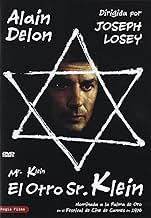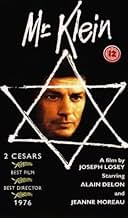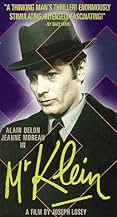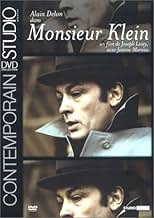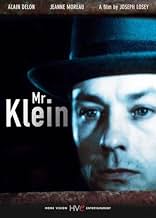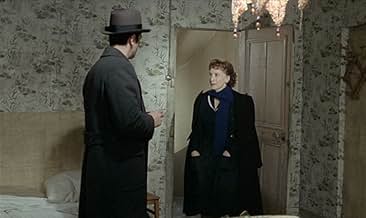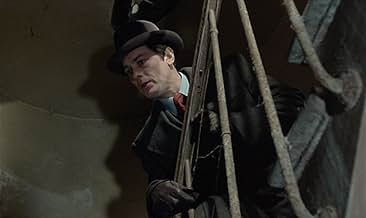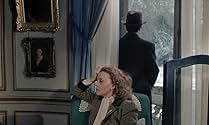Nella Parigi occupata dai nazisti, un immorale commerciante d'arte conduce una vita di lusso, fino a quando una copia di un giornale ebraico lo porta all'attenzione della polizia, collegando... Leggi tuttoNella Parigi occupata dai nazisti, un immorale commerciante d'arte conduce una vita di lusso, fino a quando una copia di un giornale ebraico lo porta all'attenzione della polizia, collegandolo a un misterioso sosia. Può scagionarsi?Nella Parigi occupata dai nazisti, un immorale commerciante d'arte conduce una vita di lusso, fino a quando una copia di un giornale ebraico lo porta all'attenzione della polizia, collegandolo a un misterioso sosia. Può scagionarsi?
- Premi
- 3 vittorie e 6 candidature
- Nicole
- (as Francine Berge)
- Pierre
- (as Michel Lonsdale)
- Lola - la danseuse
- (as Magali Clement)
Alain Delon's Top 10 Films, Ranked
Alain Delon's Top 10 Films, Ranked
Trama
Lo sapevi?
- QuizThis was originally going ahead as a Costa Gavras project in 1974.
- Citazioni
Le vendeur: Six hundred louis.
Mr. Robert Klein: Three hundred.
Le vendeur: You must be joking. At that price, I'd rather keep it.
Mr. Robert Klein: As you wish.
Le vendeur: It's easy for you, when a man is forced to sell.
Mr. Robert Klein: But I'm not forced to buy. I'm not a collector. For me it's just a job.
Le vendeur: Make me a reasonable offer.
Mr. Robert Klein: Three hundred.
- ConnessioniFeatured in Les rendez-vous du dimanche: Episodio datato 6 marzo 1977 (1977)
The story takes place in German-occupied Paris in the winter of 1942. Robert Klein (Alain Delon) is an art dealer who leads a comfortable life by taking advantage of the opportunity to buy at low prices paintings from the collections of Jews who were forbidden to practice their professions or trades and who had to sell household objects, including art, in order to survive. The ambiguity of his Alsatian name puts him in an awkward position when he is mistaken for another, Jewish, Robert Klein and begins to receive the newspaper of the Jewish community. Being a Jew in occupied Paris was more than a social stigma, and in trying to clarify the situation, Mr. Klein became entangled in the intricacies of the Petain regime's bureaucracy. The search for his alter-ego becomes a kind of police intrigue in a world that has become absurd according to the criteria of logic and legality that he had known until then. Gradually, he begins to open his eyes to the extent of the discrimination suffered by the Jews and which he had taken advantage of until then nonchalantly. Trying to prove his own 'national purity', Mr Klein starts to get closer the other Robert Klein, who had endangered, intentionally or unintentionally, his easy existence until then. The two Robert Kleins never meet but their destinies are linked.
The quality of Joseph Losey's film-making is remarkable. Paris under occupation, decadent and indifferent, in which part of the population had adopted the slogans, policies and racial legislation of the occupiers and had become complicit in persecutions and deportations denying the democratic principles of France, is brought to the screen with authenticity and carelessness. Attentive as always to detail, Losey creates various interior sets, from the hero's sophisticated apartment or residence in a castle of the probable mistress of the other Robert Klein to his rented, miserable and rat-infested house or the corridors of the police prefectures. The streets are deserted, cold, hostile and if vehicles appear they are police or Gestapo cars. Music plays an important role in two key scenes, one taking place in the castle, the other in a cabaret. The sound of the phones is as threatening as in Hitchcock's movies. Last but not least, the final scene is probably the first on-screen rendition in a feature film of the arrests and deportations of the Paris Jews from the Winter Velodrome, a historical episode kept under silence until then, which many French would have preferred to forget. Alain Delon builds his role between nonchalance and defiance, between trying to ignore realities and assuming them. Among the actors in the cast, I must also mention Jeanne Moreau and Michael Lonsdale, two formidable actors who are cast here in consistent supporting roles. The ending is debatable and was debated, open to many interpretations that have not, I think, been definitively settled by this day. IMDB mentions that Costa-Gavras also contributed to the script, although he is not listed in the credits. 'Mr. Klein' is a must-see film about occupied France and the attitude of the French towards the Holocaust, a film worth seeing, thinking about and discussing.
I più visti
- How long is Mr. Klein?Powered by Alexa
Dettagli
- Data di uscita
- Paesi di origine
- Lingua
- Celebre anche come
- Chi è Mr. Klein?
- Luoghi delle riprese
- Brasserie La Coupole - 102 Boulevard Montparnasse, Paris 14, Parigi, Francia(Mr Klein called by the bellboy)
- Aziende produttrici
- Vedi altri crediti dell’azienda su IMDbPro
Botteghino
- Budget
- 3.500.000 USD (previsto)
- Lordo Stati Uniti e Canada
- 213.769 USD
- Fine settimana di apertura Stati Uniti e Canada
- 15.915 USD
- 8 set 2019
- Lordo in tutto il mondo
- 219.070 USD
- Tempo di esecuzione2 ore 3 minuti
- Mix di suoni
- Proporzioni
- 1.66 : 1
Contribuisci a questa pagina




